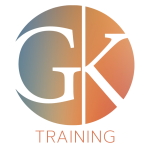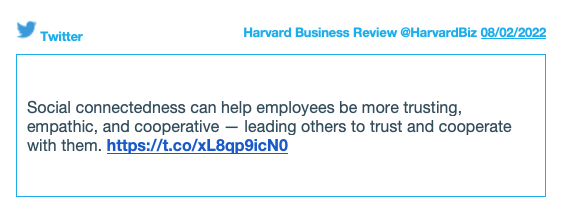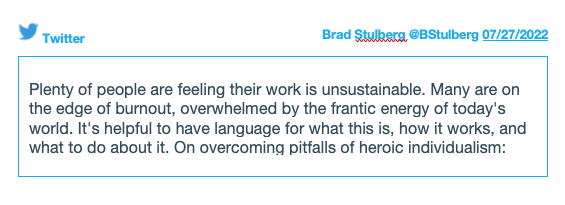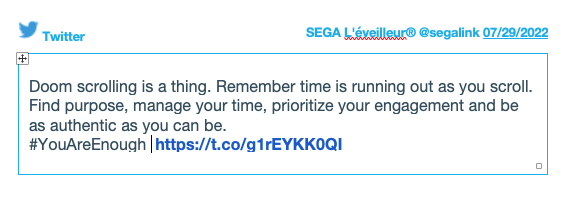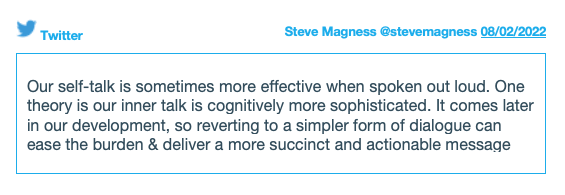
Communication Skills Lessons from the Open Road
December 1, 2021
I Am a Camera
August 28, 2022
August 4th, 2022 Briefing

By: Michael Chad Hoeppner
Published: August 4th, 2022
If you scan your newsfeed or social platforms for more than a moment, you’ll find story after story about frayed attention spans, exhausted work forces, and overwhelmed professionals. Newly invented terms like zoom fatigue and doom scrolling (along with seemingly evergreen ones like burn out) paint a picture of a society of stressed-out zombies who haven’t exercised or eaten well in ages, and who have the attention span of a goldfish.
I exaggerate (a little).
As someone who coaches professionals on their communication in vastly divergent areas (finance, legal, pharma, tech, politics, professional sports), I want to offer you two things to help navigate our current professional moment:
1. The comfort of knowing you’re not alone
2. A tool you’ve probably never thought about that can improve your day-to-day right now
One. It’s not just you! Lawyers I coach show up to sessions on two hours sleep the previous night. Managing partners at financial firms email me on Sunday afternoons with fresh-off-the-presses drafts of speeches. So, if you’re spread thin, you have lots of company.
Two. There is something super easy you can do right now to improve your life, energy level, and mental and physical health: communicate. I don’t mean that in the traditional “if you speak your truth and share your feelings, you’ll feel better.” I literally mean the act of speaking can be a health practice. Why? The professionals I coach learn something brand new to most people: Communication is a physical art. To make sound (and ultimately words), your body does a remarkable act of physical coordination: your diaphragm drops down to allow the lungs to fill with air; your guts get pushed down and out to create room for your inflating lungs; you exhale that air and as it moves past your vocal chords; that vibration creates sound; then your soft palate, jaw, lips and tongue shape that raw sound into tens of thousands of different words that can be combined in limitless ways. That whole pathway doesn’t even include your eyes that ascertain understanding from your audience or your hands that emphasize points with gestures.
It is not an exaggeration to say that we are communication athletes: Speaking is a form of exercising. So, if you’ve been trying to carve out time to exercise each day and have been unsuccessful in that attempt, consider fitting “exercise” into your day in a way that doesn’t add time, but does add intentionality. Treat the words you say, the breath you use, and the size you take up as the fundamental components of exercise, and—just as you might in the gym—see if you can increase your flexibility and strength: Use more breath, breathe deeper into your belly, open your mouth more to pronounce your vowels, and use your lips and tongue more dynamically to enunciate your consonants! Your health will thank you.
WHAT WE’RE READING:
How Universal Are Our Emotions?
By Nikhil Krishnan for The New Yorker on August 1, 2022
Mesquita wants us to consider this alternative model. Instead of treating emotions as mental and “inner,” perhaps we should conceive of them “as acts happening between people: acts that are being adjusted to the situation at hand,” rather than “as mental states within an individual.” Instead of seeing emotions as bequeathed by biology, we might see them as learned: “instilled in us by our parents and other cultural agents,” or “conditioned by recurrent experiences within our cultures.”
What Is the 333 Rule for Anxiety?
By Jaime Herndon for Healthline on July 28, 2022
The 333 rule is a common and informal technique for coping with anxiety. Its purpose is to help you ground yourself and calm down in a moment where you are feeling particularly anxious or overwhelmed. […] Interpersonal therapy: This is short-term supportive talk therapy that focuses on resolving interpersonal (or relational) problems.
Employees who work on vacation are more likely to quit, survey finds
By Laurel Kalser for HR Dive on July 29, 2022
If managers notice someone not taking vacations, they should bring it up in private and explain why taking time off is important for the employee’s well-being. In addition, managers can help alleviate the dread that 43% of the employees surveyed said they feel about returning to work post vacation. By addressing workload issues, managers can help reduce vacation anxiety and prevent post-vacation burnout from trying to catch up.
Designing your neural networks with leadership language
By Coach Vikram for People Matters on July 25, 2022
But affirmations tend to have more benefits when they are specific. An affirmation that is specifically tailored to your feelings can work as a powerful thought-realigning tool. It can help you change and strengthen your inner dialogue whenever you choose. And a powerful inner dialogue helps you see your affirmations manifest into reality.
WHAT INFLUENCERS ARE SAYING:
